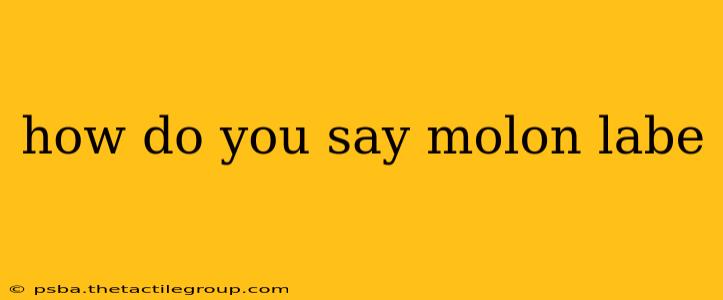How Do You Say "Molon Labe"? Understanding the Greek Phrase and its Meaning
The phrase "Molon Labe" (μολὼν λαβέ) is a concise yet powerful expression originating from ancient Greece. It's more than just a catchy phrase; it carries significant historical weight and continues to resonate today. This guide will delve into its pronunciation, meaning, historical context, and modern usage.
Pronunciation of Molon Labe
The correct pronunciation of Molon Labe is approximately moh-lawn lah-bay. The emphasis falls on the first syllable of each word. While various transliterations exist, this approximation provides a good starting point for accurate pronunciation. Listening to native Greek speakers recite the phrase is recommended for the most authentic pronunciation.
Meaning and Interpretation
Literally translated from Ancient Greek, "Molon Labe" means "Come and get them." However, its meaning transcends a simple literal interpretation. It conveys a defiant stance, a bold challenge to an aggressor, and an unwavering resolve in the face of adversity. It suggests not only a willingness to fight but a defiant refusal to surrender. The phrase implies a preparedness for battle and a contempt for the enemy's threats.
Historical Context: The Battle of Thermopylae
"Molon Labe" is most famously associated with King Leonidas I of Sparta and the 300 Spartans who made their legendary stand at the Battle of Thermopylae (480 BC) against the vastly superior Persian army. While the exact historical accuracy of the phrase being uttered at Thermopylae is debated, its association with this heroic last stand has cemented its place in history and popular culture. It represents the Spartan spirit of unwavering courage and defiance in the face of overwhelming odds.
Modern Usage and Cultural Significance
Today, "Molon Labe" remains a powerful symbol of resistance and defiance. It's often used in contexts involving:
- Military and self-defense: It serves as a motto for military units and individuals emphasizing readiness and courage.
- Political discourse: It's adopted by various groups and individuals as a statement of resistance against oppression or tyranny.
- Popular culture: The phrase appears frequently in books, movies, video games, and other media, often as a representation of courage and defiance.
However, it's crucial to acknowledge that the phrase's appropriation in modern contexts can be complex and potentially controversial. Its use needs to be sensitive to the historical context and potential misinterpretations.
Conclusion: More Than Just Words
"Molon Labe" is much more than a simple phrase; it's a historical echo, a powerful symbol, and a testament to the enduring human spirit. Understanding its pronunciation, meaning, historical context, and modern usage provides a deeper appreciation for its significance. While its use in contemporary society should be approached thoughtfully, its legacy as a statement of defiance and courage remains undeniable.

